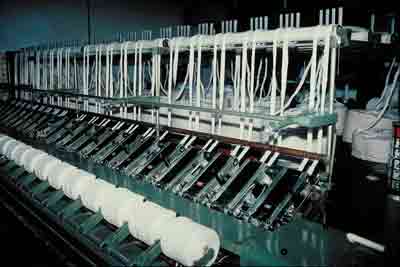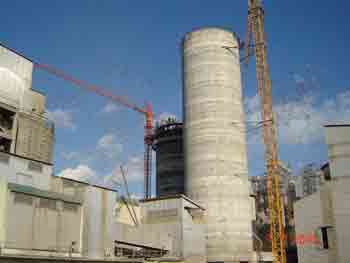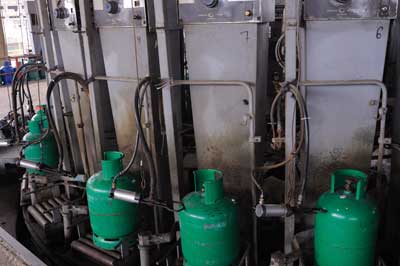Lebanon Industry: Analysis of Lebanese Industry
Most industrial production is for local consumption; however, it a significant portion is exported. Major merchandise exports are jewelry (27%); electrical equip,equipment and products (16%); base metals (13%); food products (8%), and chemical products (7%).
Lebanon Industry
 Industry in Lebanon mostly consist of small businesses that work on, or craft, imported materials and larger multi-product firms. The industrial sector ranks second in terms employment—roughly a quarter of the workforce—and constitutes about one-fifth of GDP.
Industry in Lebanon mostly consist of small businesses that work on, or craft, imported materials and larger multi-product firms. The industrial sector ranks second in terms employment—roughly a quarter of the workforce—and constitutes about one-fifth of GDP.
Most industrial production is for local consumption; however, it a significant portion is exported. Major merchandise exports are jewelry (27%); electrical equip,equipment and products (16%); base metals (13%); food products (8%), and chemical products (7%).
INDEVCO Group
 Since Lebanon has no exploitable resources, such as oil, one of the constraints on industrial production is the cost of energy, which includes electric energy that relies on oil. Nevertheless, according to Neemat Frem, CEO of INDEVCO and President of the Association of Lebanese Industrialists, “Lebanon industry has been able to grow around 20% a year.” One reason, he says, is that “we were able to penetrate new markets and compete with European goods in Africa or the Arab countries—even in Europe sometimes.”
Since Lebanon has no exploitable resources, such as oil, one of the constraints on industrial production is the cost of energy, which includes electric energy that relies on oil. Nevertheless, according to Neemat Frem, CEO of INDEVCO and President of the Association of Lebanese Industrialists, “Lebanon industry has been able to grow around 20% a year.” One reason, he says, is that “we were able to penetrate new markets and compete with European goods in Africa or the Arab countries—even in Europe sometimes.”
The secret, says Frem, is found in the quality of Lebanese workmanship.
|
Get the Flash Player to see this player.
|
“I believe if we know how to position ourselves and have the right value proposition in our products there is a new niche for the Lebanese product. «Made in Lebanon » is somehow a label for high quality products or products in which high quality is in reach. Everything that has to do with fashion or system integration, where value creation comes from integrating multidisciplinary issues, where we need creativity in products, where we need high talents for distribution ; you need an extra effort and distribution in sales. We are witnessing very interesting niches that are proving themselves in Lebanon. For instance, we make baby diapers and feminine napkins and export to maybe 40 or 50 countries. It is the integration part where Lebanon is always excelling. They’re mostly human-based indstries.“
 INDEVCO is a good example of Lebanese industry . A multinational company headquartered in Ajaltoun, Lebanon, and manufacturing and exporting a wide variety of products, it is now celebrating its 60th anniversary. “Our success,” says Frem,
INDEVCO is a good example of Lebanese industry . A multinational company headquartered in Ajaltoun, Lebanon, and manufacturing and exporting a wide variety of products, it is now celebrating its 60th anniversary. “Our success,” says Frem,
“comes from the fact that we believed a long time ago that the key component for success is the human element. Our human capital is the most important capital of INDEVCO Group. This is why our people are very much empowered ; we believe that small is beautiful, so we had autonomous companies evolving on their own with very interesting linkage, with central headquarters but also with enough freedom for entrepreneurship to excel. We have also been very focused, and focus is a very important success factor in companies. We never diversified. We focus on four sectors which are all interrelated. We have been evolving in environments and markets that themselves have been growing in the last 30 or 40 years. We have production facilities in Egypt, Lebanon, Syria and the U.S. Today we are exporting our production mainly to Europe and Africa. We consider the Gulf states and the Levant to be regional markets.”
MEDCO Group
 Another example of industrial innovation and marketing is the Chammas Group, a family owned multinational that also includes Phoenicia Oil Company. Nicolas G. Chammas tells of his pride in the
Another example of industrial innovation and marketing is the Chammas Group, a family owned multinational that also includes Phoenicia Oil Company. Nicolas G. Chammas tells of his pride in the
“multiple innovations we have introduced to the Lebanese Market that positioned us as the first national oil company, 100% privately owned by the Chammas family. To name but a few innovations, we have introduced in the early 90s, the first convenience stores in our stations-open 24/7; the first fuel management solution smart card based credit and loyalty cards branded Liters Plus and serving 65% of the corporate fleet market; the first proprietary loyalty programs to our customers and 38 NGO’s to help the community we evolve in. We are also the first national oil company to deliver jet fuel at airports throughout the world, namely at Hariri-Beirut International Airport. Further, we introduced the flow meters into Lebanon, vitamin asphalt in bulk, and delivered a heated sea line in the Mediterranean sea to receive tankers are 160 degrees centigrade. There are many firsts that we have achieved as a company.”